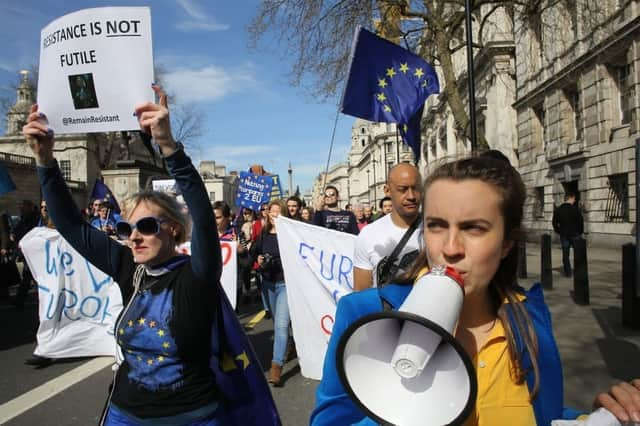The case for and against a second Brexit referendum: four experts give their views


This article contains affiliate links. We may earn a small commission on items purchased through this article, but that does not affect our editorial judgement.
Andy Price, Sheffield Hallam University; Ben Williams, University of Salford; Dion Curry, Swansea University, and Philip Cunliffe, University of Kent
Nigel Farage, the UK Independence Party MEP, surprised many on January 11 when he said he might be in favour of a second referendum on Britain’s EU membership. “I agree with Nigel,” tweeted Nick Clegg, the former Liberal Democrat leader, in response, as the comments were met with support by those in favour of the UK remaining within the EU.
Advertisement
Hide AdAdvertisement
Hide AdThe Conversation asked four political experts, who are following the Brexit process closely, on the case for or against holding a second referendum.


The case for a second referendum
Andy Price, head of politics, Sheffield Hallam University
Regardless of whether you voted Leave or Remain, the 18 months since the referendum have shown what a challenge Brexit is to deliver, and some of the long-term impacts the UK’s departure from the EU will have. This is why the simple, one-off question put to the electorate in the June 2016 referendum was never going to be the final word on this.
This was never a binary choice of in or out of the European project, as shown by ongoing discussions around membership of the single market and the customs union.


What really should have appeared on the ballot in 2016 was a series of questions: do you want to leave the EU as a whole? Would you like to stay in the single market and the customs union? Do you value freedom of movement, integrated financial systems, the reduction of barriers to trade?
Advertisement
Hide AdAdvertisement
Hide AdOf course, it was unlikely (but not impossible) that such a long list of questions could be put to the electorate, not least because it would have been a confusing turn off for voters. But this why a second referendum is now required.
It’s essential because we only started to ask the questions above after June 2016. Not only did we not know the answers to such questions at the time of the original referendum, but the vast majority of people couldn’t have fully understood the questions.
Put simply, the June 2016 referendum started a meaningful national debate about EU membership for the first time in at least a generation. This debate should have happened many years ago, but it is happening now. And only once this debate is over, once we have heard everything we need to hear about what EU membership means, should the electorate then decide whether they support it or not.


For those that worry that the divisions that have emerged since June 2016 will only be prolonged by a second referendum, I would say this: handled sensibly and sensitively, avoiding all of the mistakes made first time around, the next referendum could be based on analyses that are checked and double checked, on a meaningful engagement of experts and practitioners from all sectors of society, and carried out with the explicit acknowledgement that this is the final vote on this matter. Indeed, this might well be the only way to overcome in EU Ref #2 the emotional divides caused by EU Ref #1.
Divisions at home and abroad.Shutterstock
Advertisement
Hide AdAdvertisement
Hide AdBen Williams, tutor in politics and political theory, University of Salford
The primary argument in favour of holding a second referendum is that there have been further significant political developments and changes since the original vote in favour of Brexit. These have included various shifts within the UK economy, the nature of the final likely “divorce” settlement with the EU, and ongoing movements in public opinion. It is ultimately a core element of any liberal democracy that voters have the right to change their mind or review key political decisions if circumstances appear to have changed.


An argument often cited by opponents of Brexit is that the vote of June 2016 indicated a somewhat narrow desire for “departure” from the EU, but it did not endorse what the final “destination” would be. For example, whether the UK would remain within the single market.
With a rather hazy destination in the pipeline, Remainers argue that this would justify a revision of the referendum decision. In addition to this distinction between departure and destination, opponents of Brexit have bolstered their argument by casting doubt on the contentious claim of Brexiters that they would reallocate £350m of funding a week from the EU to the NHS.
Advertisement
Hide AdAdvertisement
Hide AdOn this basis, there is a strong argument to make that the voters deserve a further say on any final deal agreed with Brussels.
Nigel Farage’s somewhat surprising intervention in calling for a second referendum comes from a different angle. He is apparently calling for a further vote to settle the issue for “a generation”, and to silence persistent critics of Brexit such as Tony Blair, Andrew Adonis and Nick Clegg. There is some consistency in his position; before the referendum result he said he would continue to campaign against a narrow Remain vote.
While this represents a gamble from a winning position, Farage is said to believe that a further referendum would produce an even more decisive vote for Leave by motivating Brexiteers who feel that “establishment” politicians are ignoring their democratic wishes by obstructing Brexit.
The case against


Philip Cunliffe, senior lecturer in international conflict, University of Kent
Advertisement
Hide Ad